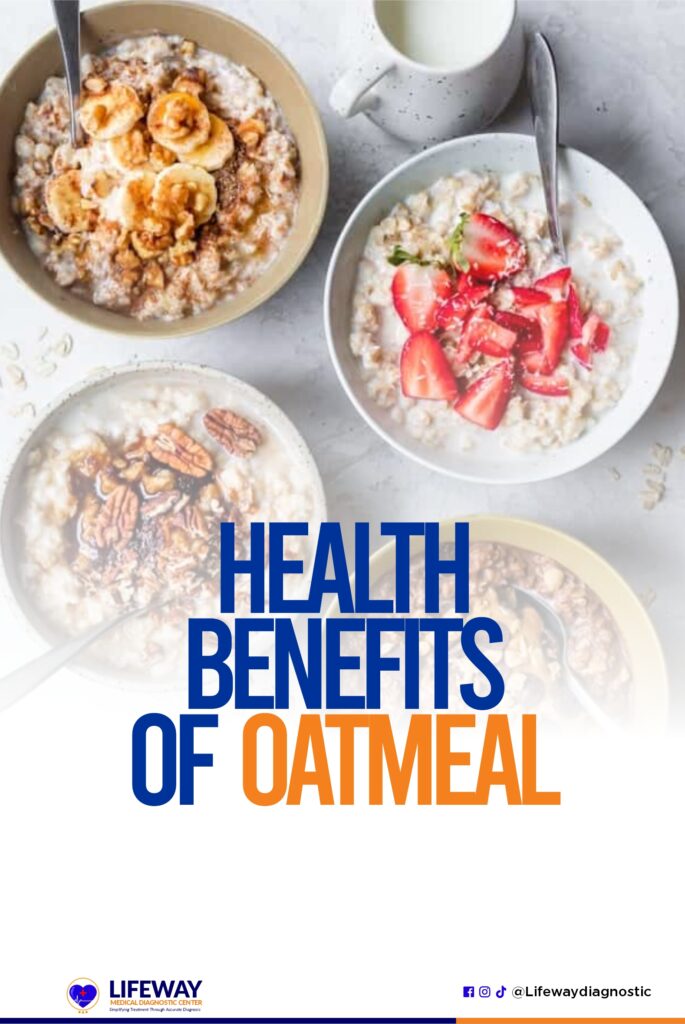If you haven’t been a fan of oatmeal, it’s worth trying now because there are numerous scientifically proven health benefits of oatmeal.

Experience a healthier life with these incredible benefits: weight loss, lower blood sugar levels, immune system boosting, lower cholesterol, better blood control, reduced risk of heart disease, and more!
Oatmeal can be a versatile addition to meals and snacks throughout the day, not just for breakfast. Incorporating this healthy meal into your food routine has never been more important.
This article will explore the various health benefits of oatmeal and provide comprehensive information about its nutritional content.
What is Oatmeal?
Oatmeal is a type of hot cereal made from oats, which are the seeds or grains of the oat plant (Avena sativa).
Also, oatmeal is a popular breakfast dish that is often enjoyed for its nutritional benefits and comforting taste. Furthermore, oatmeal can be enjoyed in a variety of ways.
Known for its high fiber content, oatmeal provides both soluble and insoluble fiber, which can help promote digestion and contribute to a feeling of fullness. It is also a good source of vitamins, minerals, and antioxidants.
Types of Oatmeal
There are different types of oatmeal available, each with its characteristics and cooking methods. Here are some common types of oatmeal:
1. Rolled Oats
Rolled oats, also called old-fashioned oats, are made by steaming and then rolling oat groats into flat flakes. They typically take 5-10 minutes on the stovetop.
Rolled oats have a more tender texture and are commonly used in recipes like cookies, granola bars, and overnight oats.
2. Oat Flour
Oat flour is made by grinding whole oats into a fine powder. It is commonly used as a gluten-free alternative to wheat flour in baking recipes, such as pancakes, bread, and muffins.
In some parts of Africa, for instance, Nigeria, oat flour is used as a swallow for soups. Oat flour adds a mild, slightly sweet flavor and a moist texture to baked goods.
3. Instant Oats
Instant oats, also referred to as quick oats, are pre-cooked and then dried, making them the quickest-cooking type of oatmeal.
They are often sold in individual packets and can be prepared by simply adding hot water or microwaving for a few minutes. Instant oats have a softer texture and can be a convenient option for those with limited time.
4. Steel-Cut Oats
Also known as Irish oats, steel-cut oats are whole oat groats that have been chopped into small pieces with steel blades. Steel-cut oats have a chewy texture and a nutty flavor.
Steel-cut oats take longer to cook, unlike other types of oatmeal, usually requiring about 20-30 minutes.
5. Scottish Oats
Scottish oats are similar to steel-cut oats but are ground into smaller pieces, resulting in a creamier texture when cooked.
They are traditionally used to make a dish called “porridge” and require a longer cooking time than rolled oats.
Nutritional Value of Oats
Oats are highly nutritious and offer a range of health benefits. Here is an overview of the nutritional value of oats:
- Dietary Fiber: Oats are very rich in dietary fiber, which is beneficial for digestive health and helps promote feelings of fullness. The two main types of fiber found in oats are soluble and insoluble fiber.
Soluble fiber, especially beta-glucan, has been shown to help lower cholesterol levels and improve heart health. - Healthy Fats: Oats are naturally low in fat, but the fat they do contain is mostly unsaturated fat, including both monounsaturated and polyunsaturated fats, which are considered heart-healthy.
- Carbohydrates: Oats are a good source of carbohydrates, providing energy for the body. They have a lower glycemic index than refined grains, meaning they have a slower impact on blood sugar levels.
- Antioxidants: Oats contain antioxidants, including avenanthramide, which have anti-inflammatory properties and may contribute to heart health.
- Protein: Oats contain a moderate amount of protein, which is important for building the body and repairing tissues.
- Vitamins and Minerals: Oats are a good source of various vitamins and minerals, including manganese, phosphorus, magnesium, copper, iron, zinc, and B vitamins such as thiamine (B1) and folate (B9).
It’s important to note that the nutritional value of oats can vary depending on the specific type of oats and the preparation method. For instance, instant oats may have a slightly lower fiber content compared to steel-cut or rolled oats.
Incorporating oats into a balanced diet can contribute to overall health and well-being. They can be enjoyed as oatmeal, added to smoothies, used in baking recipes, or as an ingredient in granola bars and other snacks.
Health Benefits of Oatmeal
There are several health benefits of oatmeal due to its nutrient composition. Here are some of the key health benefits associated with oatmeal:
a) Heart Health
Consuming oatmeal regularly as part of a heart-healthy diet may contribute to improved cardiovascular/health health.
b) Blood Sugar Control
The soluble fiber in oatmeal slows down digestion and the absorption of carbohydrates, helping to stabilize blood sugar levels and improve insulin sensitivity.
This makes oatmeal a suitable option for individuals with diabetes or those aiming to manage blood sugar levels.
c) Digestive Health
The fiber content in oatmeal supports a healthy digestive system by promoting regular bowel movements and preventing constipation.
It also acts as a prebiotic, providing nourishment for beneficial gut bacteria.
d) Antioxidant Properties
Oats contain antioxidants that have anti-inflammatory and potentially protective effects on heart health.
These antioxidants help combat oxidative stress and may contribute to reducing the risk of chronic diseases.
e) Nutrient-Rich
Oatmeal is packed with essential nutrients, including manganese, phosphorus, magnesium, copper, iron, and B vitamins like thiamine and folate.
These nutrients play crucial roles in energy production, bone health, immune function, and overall well-being.
f) Weight Management
Oatmeal’s high fiber content and ability to promote satiety can aid in weight management.
The feeling of fullness it provides may help reduce overall calorie intake and prevent overeating.
Additionally, the slow digestion of oatmeal helps maintain stable energy levels and can curb cravings.
g) Cholesterol Management
The soluble fiber, particularly beta-glucan, forms a gel-like substance in the digestive tract, which helps lower LDL cholesterol levels in the body.
How To Make Oatmeal
Making oatmeal is a straightforward process that can be customized to suit your taste and dietary needs. Here’s a basic recipe for making stovetop oatmeal:
Ingredients:
1 cup oats
2 cups water or milk (dairy or plant-based)
Pinch of salt (optional)
Toppings of your choice (e.g., fruits, nuts, honey, cinnamon)
Instructions:
- Measure out 1 cup of oats and set them aside.
- In a saucepan, bring 2 cups of water and add your diary-free milk to boil. If desired, you can add a pinch of salt to enhance the flavor.
- Once the liquid is boiling, add the rolled oats to the saucepan and reduce the heat to medium-low.
- Stir the oats occasionally to prevent sticking and cook for about 5-10 minutes, or until the oats reach your desired consistency. The longer you cook the oats, the softer and creamier they become.
- Once the oats are cooked to your liking, remove the saucepan from the heat, and let the oatmeal rest for a minute or two to thicken.
- Serve the oatmeal in bowls and add your favorite toppings, such as cocoa powder, vanilla extract, fresh or dried fruits, nuts, seeds, honey, maple syrup, nutmeg, or a sprinkle of cinnamon.
Stir the toppings into the oatmeal, and your delicious bowl is ready to enjoy!
Alternative cooking methods, such as using a microwave or overnight soaking, can also be employed depending on the type of oats and desired convenience.
Conclusion
Discover the numerous health benefits of oatmeal, a nutritious and versatile grain. Packed with fiber, oats can support digestive health and promote feelings of fullness.
They contain heart-healthy nutrients, like beta-glucan, that help reduce cholesterol levels. Oats also provide a good source of protein, essential vitamins, minerals, and antioxidants.
With their low glycemic index and healthy fats, oats make a satisfying and nourishing addition to a balanced diet.
Start now to incorporate oatmeal into your meals for improved well-being using the recipe we shared with you on how to make oatmeal. You can thank us later by dropping a comment.
